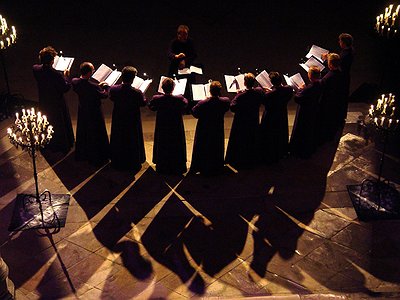Part 2
Collaborations can take on many forms. What role do they play in your approach and what are your preferred ways of engaging with other creatives, such as the ensembles you're working with?
Generally, when we’re working with other artists they are providing some form of accompaniment to the choir and that role has to be carefully considered. Orchestras are there to provide lots of wonderful colour and vitality to a performance of some choral works, but essentially we’re all there to communicate the meaning of the words we’re singing, whether a singer or a player - note, I didn’t say “singer or musician”! I always want to make sure we get as much out of every different texture in a score as we can, and sometimes that can mean the singers take a back seat and allow the instrumentalists bring their own sound world to the fore.
Do you have a fixed schedule? How do music and other aspects of your life feed back into each other - do you separate them or instead try to make them blend seamlessly?
In this day and age Tenebrae is busier than it has ever been. I spend a good deal of my time working with our management team, helping with the administration and planning of concerts, recordings and tours months if not years in advance.
Can you talk about a breakthrough work, event or performance in your career? Why does it feel special to you? When, why and how did you start working on it, what were some of the motivations and ideas behind it?
Path of Miracles by Joby Talbot has turned out to be something of a life-changing experience. Working together as a tight team on a piece in 17 different parts, unaccompanied for over an hour, it has brought Tenebrae together as an ensemble more than any other piece in our repertoire. I think once we discovered that shared joy of creating, and a feeling of ownership of such a special piece of music, we have all hankered after rekindling it for every concert we give.
There are many descriptions of the ideal state of mind for being creative. What is it like for you? What supports this ideal state of mind and what are distractions? Are there strategies to enter into this state more easily?
If we simply focus on the music and working together to do whatever is best for it, then the requisite focus is always achievable to give of our best.
Music and sounds can heal, but they can also hurt. Do you personally have experiences with either or both of these? Where do you personally see the biggest need and potential for music as a tool for healing?
Music can certainly heal and it’s important to be aware of that. However, I don’t feel that should be your aim all the time. It depends entirely on which piece of music you are performing and what the composer is wanting to communicate. Sometimes the simplest piece of music can ‘hurt’ - that’s not really the right word - as it can remind one of a time when perhaps life was difficult or challenging for whatever reason. Music can of course simply remind you of a loved one who has passed away, and so it has the ability to become incredibly emotive. Music can communicate in so many ways to people but the trigger that creates a response from a listener can be one of a thousand things. If we can create an intense focus on the music and make a performance something of an immersive experience for the listener, then those triggers can be hit in a multitude of ways. I suppose I am saying “Each to his own”.
Art can be a purpose in its own right, but it can also directly feed back into everyday life, take on a social and political role and lead to more engagement. Can you describe your approach to art and being an artist?
I love music and I love performing it. I want to share that love of the music and what I do with audiences. If I can achieve that then this art form, such as it is, will endure for ever as people need to feed their emotional needs in a myriad of different ways. Music is one of these, an incredibly powerful method to communicate with people. I’m a custodian of my chosen art and I feel if I do it well enough and for the right reasons then I will one day hand over my love and skill to someone else who will, in turn, bring beautiful music to listeners all over the world. It’s all about the music and the art rather than all about the musician and the artist. Yes, you need the means of communicating this art (i.e. us musicians), but the focus always needs to be in the right place.
What can music express about life and death which words alone may not?
If I knew the answer to that I’d write it down in a programme note and be a very wealthy man off the back of it! Music can speak to people in so many different ways. On any given day, a piece of music can have a different impact on one person to the next, and there are a million and one reasons for that. Music lives and breathes, just like us, and when performed with skill and spontaneity is an extremely powerful and evocative way of communicating and provoking a visceral response that takes people by surprise. I think that’s the reason why music can move people in a way that the spoken word can’t.






